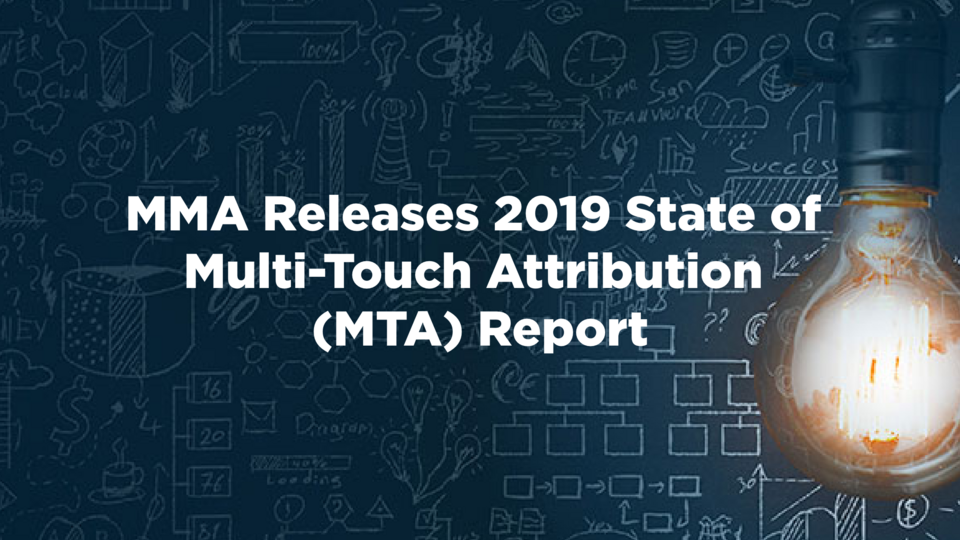December 19, 2019
Marketers Continue to Believe in MTA Despite Increasing Privacy and Data Challenges in the Ecosystem
NEW YORK, December 19, 2019 — A new MTA Benchmark Report released today from the MMA shows that a growing share of marketers see multi-touch attribution as a crucial tool to the future of their marketing measurement and are investing to build their data capabilities. According to the survey, adoption of MTA reached 45% in 2019, a notable change from 35% in 2016, despite the increasing challenges in privacy and data.
The 2019 MTA report marks the fourth year of the annual marketer study on the state of MTA, but this year, it provides more granular insights on data capabilities and challenges in MTA implementation. One of the key finding of the study is that although a lot more marketers realize the importance of unified IDs in 2019 (39% of marketers have a DMP with such capabilities vs 29% in 2018), the majority are still not ready for “people based marketing” - either not having such capabilities (32%) or not being familiar with them (29%).
In fact, the study reveals that most non-users of MTA still rely on unsophisticated and misleading attribution approaches like click-through reports and linear attribution (i.e. first touch, last touch), illustrating a big divide in data capabilities between MTA users and non-users.
“Most marketers agree that Multi-Touch Attribution is the future of marketing measurement but building the right data infrastructure and executing MTA is still really hard.” explains Greg Stuart, CEO of the MMA. “MTA is essential in today’s extraordinarily fragmented media world, but is still in its infancy; nonetheless, the MMA Board has continued to push the MMA to lead marketers to succeed in this area based in part on 5 years of MMA led public MTA studies for companies like Unilever, Allstate, Coca-Cola, Ford, MillerCoors, and other leading marketers.”
The newly released study highlights that MTA adoption is indeed a long and difficult process. Three quarters of marketers are currently in some stage of establishing an MTA approach -14% have just initiated the process, 13% are working to establish data readiness, 11% are setting up their first project, 16% are implementing the first project, while 19% are focused on full MTA deployment.
Additionally, the study illustrates that there are certain roadblocks for MTA that can only be resolved at the Industry level, mainly data quality and linking issues (55% and 42% respectively). Marketers can’t rely on their MTA providers to solve these challenges, in fact their satisfaction from these solutions is still very low; as the study shows, the average net promoter score of MTA solution providers remained negative in 2019 at -26.
“The proof of what MTA delivers to marketers is the reason why we are so committed to empowering brands to solve their main challenges when it comes to making the most out of MTA” says Vassilis Bakopoulos, SVP - Head of Industry Research at the MMA and the lead of this study.
In addition to releasing the 2019 State of MTA Report, the MMA is hosting a series of webinars to further help marketers track the end-to-end MTA journey and master the specifics of each stage. The first webinar was held on November 19th and a recording is available on the MMA website. The MMA has also formed a Future of MTA Data Identifiers working group, aiming to address some of the biggest data challenges, not only with MTA, but all data-driven marketing efforts. And for an even deeper dive into the future of marketing attribution, MMA’s MATT Unplugged event will be held May 5th in New York City.
For more information on how to get involved with the MMA and the Marketing Attribution Think Tank (MATT) please visit http://www.mmaglobal.com/matt or contact [email protected].
About the MMA:
Comprised of over 800-member companies globally and 14 regional offices, the MMA is the only marketing trade association that brings together the full ecosystem of marketers, tech providers and sellers working collaboratively to architect the future of marketing, while relentlessly delivering growth today. Anchoring the MMA’s mission are four core pillars; to cultivate inspiration by driving innovation for the Chief Marketing Officer; to build the mobile marketing capabilities for marketing organizations through fostering know-how and confidence; to champion the effectiveness and impact of mobile through research providing tangible ROI measurement; and to advocate for mobile marketers.
Members include: 1-800-Flowers.com, Adobe, Ahold Delhaize, Allstate, Ally Financial, American Eagle, American Express, AT&T, Bank of America, Calvin Klein, Campbell’s, Carbon, JPMorgan Chase, Chipotle Mexican Grill, Chobani, Choice Hotels, Citi, Clear Channel Outdoor, Colgate Palmolive, Cuebiq, CVS Health, Dunkin’ Brands, eBay, E*TRADE, Electronic Arts, ESPN, Estee Lauder, Facebook, Ford, Foursquare, General Motors Company, Google, Hilton Worldwide, IBM Watson, Jumpshot, Kellogg Company, Kochava, LinkedIn, L’Oréal, Lightbox, Marriott International, Match Group, Mastercard, McDonald’s, MillerCoors, Monster, Neustar, NBCU, OpenMarket, OpenX, Pandora, Pfizer, Pinterest, PlaceIQ, Procter & Gamble, Salesforce, Samsung, Snap Inc., SUBWAY, Target Inc., The Coca-Cola Company, T- Mobile, Turner Broadcasting, Twitter, Uber, Unilever, Verizon Media Group, Verizon Connect, Vibes, Walmart, Waze, Yieldmo, Zurich and many more. The MMA’s global headquarters are located in New York with regional operations Asia Pacific (APAC), Europe/Middle East/Africa (EMEA) and Latin America (LATAM). For more information see http://www.mmaglobal.com.
Media ContactsGreg Stuart
CEO
MMA Global
[email protected]
+1 631 702 0682
